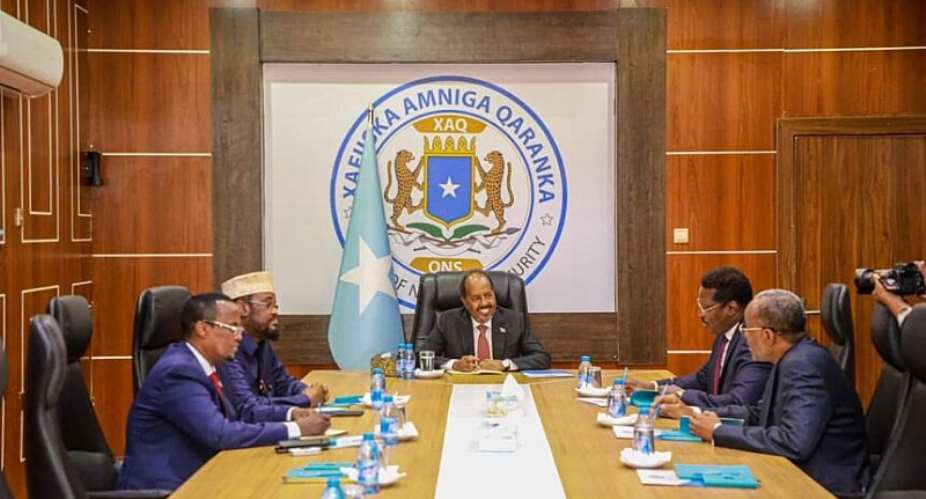Somalia is a country with a long history of political instability, dictatorship, and abuses of power. In recent years, the country has made progress towards restoring peace and stability. However, the national consultation council recently announced that Somalia will be moving towards a new presidential system, leaving many wondering whether this will be a positive change for the country.
While many argue that a presidential system could provide stronger leadership and better accountability, others fear that this change could put Somalia's fragile stability at risk. Here, let's explore the pros and cons of Somalia's plan for a new presidential system.
Pros of a Presidential System
A presidential system would provide Somalia with a clear and strong leader who is accountable to the people. This could help to increase efficiency in decision-making and could lead to a more stable government. Additionally, a presidential system could help to promote a stronger sense of national unity and could potentially reduce the influence of clans in Somali politics.
Another advantage of a presidential system is that it provides a clear distinction between the executive branch and the legislative branch. This can help to prevent any confusion or conflicts of interest between these two branches of government.
Cons of a Presidential System
There are also several disadvantages to a presidential system, particularly in a country like Somalia with a history of abuses of power and dictatorship. One major concern is that a presidential system could lead to the concentration of power in the hands of one person, leaving the door open for abuses of power and corruption. Given Somalia's past history with authoritarian leaders, this is a legitimate concern.
Furthermore, a presidential system reduces the power of parliament, which could undermine the representation of the people and the democratic process. This could make it more difficult for ordinary citizens to have their voices heard in government.
Finally, there is the risk that a presidential system would exacerbate the already fragile stability of Somalia, potentially leading to further violence and political turmoil.
Given the pros and cons of a presidential system, it is important for Somalia to proceed with caution and to focus on strengthening its existing parliamentary system instead of shaking things up completely. Somalia can learn from former UN Special Representative to Somalia, Nicholas Kay, who pointed out that progress could be made within the parliamentary system and that it was “better to bring all partners together to work on that, meaning building strong institutions, rule of law , opposition parties, and constituencies.”
In conclusion, Somalia's move towards a presidential system is a significant decision that has the potential to affect the stability of the country for years to come. While a presidential system could provide some advantages in terms of strong leadership and accountability, there are also many disadvantages, including the risk of abuses of power and undermining the democratic process.
It is important for Somalia to proceed with caution and to focus on strengthening its existing parliamentary system, building strong institutions, and ensuring that checks and balances are in place to prevent any abuses of power. If this is done successfully, Somalia could achieve greater stability, democracy, and prosperity for all its citizens.





 Former Kotoko Player George Asare elected SRC President at PUG Law Faculty
Former Kotoko Player George Asare elected SRC President at PUG Law Faculty
 2024 elections: Consider ‘dumsor’ when casting your votes; NPP deserves less — P...
2024 elections: Consider ‘dumsor’ when casting your votes; NPP deserves less — P...
 You have no grounds to call Mahama incompetent; you’ve failed — Prof. Marfo blas...
You have no grounds to call Mahama incompetent; you’ve failed — Prof. Marfo blas...
 2024 elections: NPP creates better policies for people like us; we’ll vote for B...
2024 elections: NPP creates better policies for people like us; we’ll vote for B...
 Don’t exchange your life for wealth; a sparkle of fire can be your end — Gender ...
Don’t exchange your life for wealth; a sparkle of fire can be your end — Gender ...
 Ghana’s newly installed Poland train reportedly involved in accident while on a ...
Ghana’s newly installed Poland train reportedly involved in accident while on a ...
 Chieftaincy disputes: Government imposes 4pm to 7am curfew on Sampa township
Chieftaincy disputes: Government imposes 4pm to 7am curfew on Sampa township
 Franklin Cudjoe fumes at unaccountable wasteful executive living large at the ex...
Franklin Cudjoe fumes at unaccountable wasteful executive living large at the ex...
 I'll 'stoop too low' for votes; I'm never moved by your propaganda — Oquaye Jnr ...
I'll 'stoop too low' for votes; I'm never moved by your propaganda — Oquaye Jnr ...
 Kumasi Thermal Plant commissioning: I pray God opens the eyes of leaders who don...
Kumasi Thermal Plant commissioning: I pray God opens the eyes of leaders who don...
